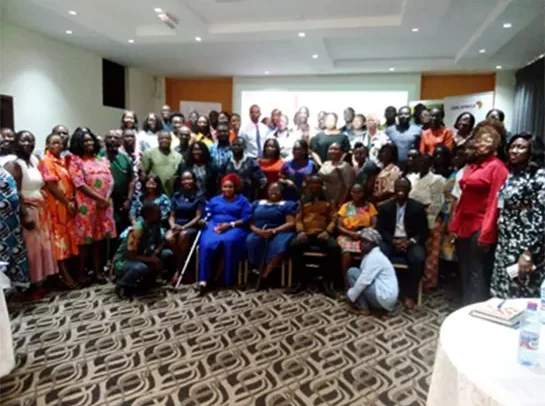Participants at the workshop
The Africa Centre for Democracy and Socio-economic Development (CDS-Africa), in partnership with the Centre for Learning and Childhood Development (CLCD) and Songtaba during a training workshop held in Accra on September 11, 2025, demanded recognition for unpaid care work for carers of children with developmental disabilities.
The Director of Research for CDS-Africa, Dr. Abena Boateng, emphasised that the work of unpaid carers is often overlooked and under supported despite the crucial roles they play. She described the workshop as an important milestone in the ongoing campaign to bring visibility and value to the essential but often invisible labour of caregiving, a role disproportionately carried by women, particularly in households supporting children with developmental disabilities.
“Today marks an important milestone in our collective efforts to bring visibility and value to the tireless, and often invisible, work of parents, guardians, and caregivers. For too long, unpaid care work – especially in the context of children with developmental disabilities – has remained under-recognised, under-supported, and undervalued, despite the profound impact it has on families, communities, and our nation,” she said.
Ms. Boateng explained that the workshop is part of a broader research and advocacy initiative launched over a year ago to use real-life evidence in support of scaling up Ghana’s inclusive education policy. The project aims to ensure that inclusive education becomes fully implementable across all public schools in Ghana, with special consideration given to the challenges faced by caregivers.
“A little over a year ago, we embarked on this journey to use tangible, real life evidence to support the call for Ghana’s inclusive education policy to be scaled up and made implementable in all public schools in Ghana,” she explained.
She stated that the project was made possible due to funding made by International Development Research Centre (IDRC). The project, according to her, has conducted extensive research, developed evidence-based recommendations, and engaged stakeholders through a collaborative approach. A steering committee, comprising carers, experts, and community leaders, was instrumental in co-designing data collection tools and shaping the overall direction of the research.
“Today’s workshop is one of many platforms we are using to reflect on our findings, share lessons learned, and explore actionable strategies to influence both policy and practice. We must put carers’ voices at the centre of this conversation and explore meaningful ways to reduce their burden, including making schools more inclusive,” she added.
By Vera Owusu Sarpong


